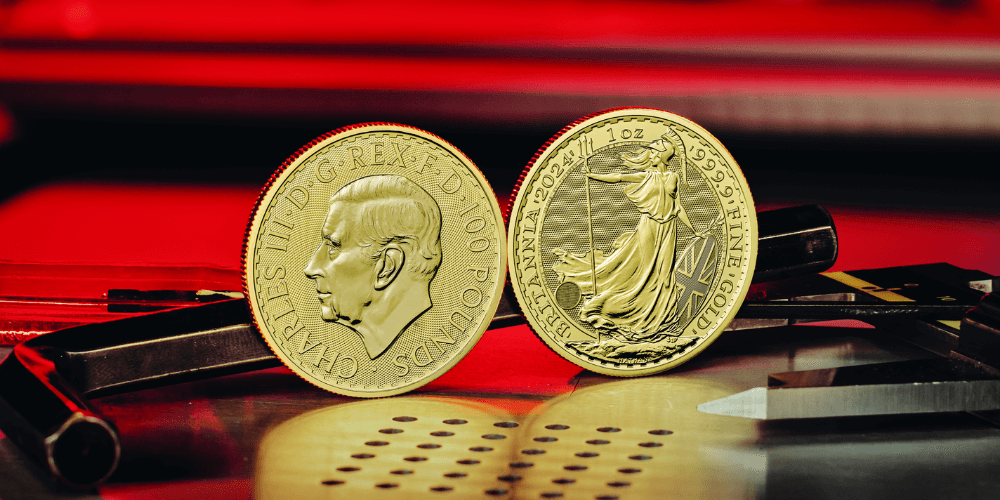Golden Opportunities: Maximising The Tax Benefits of Gold Investment
The Royal Mint
July 2024
Category: Invest

Gold's role as a risk management tool within a diversified portfolio is widely recognised. However, with evolving policy landscapes, some forms of gold investment also offer additional tax benefits.
In the investment world, gold has long been valued as a store of wealth and a hedge against economic uncertainties. For UK investors, physical gold, including bullion bars, Sovereign coins, and Britannia coins, is particularly appealing. Beyond the inherent stability of gold, UK tax benefits associated with physical gold investments make it an attractive option for those looking to diversify their portfolios while enjoying tax advantages.
Capital Gains Tax Advantages
Capital Gains Tax (CGT) has been a significant policy topic recently, with major changes affecting investors, notably the reduction in the CGT annual exemption. This reduction limits the amount an individual or trust can realise as a capital gain without being subject to CGT.
As the CGT annual exemption decreases, investors might explore other CGT-efficient assets that also offer diversification benefits in uncertain economic times. Bullion coins, for example, are CGT exempt due to their status as legal tender. They are also popular globally for their timeless design, historical significance, and enhanced security features.
Understanding Capital Gains Tax
CGT is the tax you pay on the profit made from selling a taxable asset. It applies to assets such as bullion, property, or shares. Unlike Income Tax, CGT is only charged on the gain made from the sale of the asset. However, if your total gains in a tax year fall below the CGT allowance of £3,000 (2024/25), you do not have to pay CGT. It is the responsibility of the individual investor to declare any CGT payable.
Bullion Coins and Capital Gains Tax
Bullion coins from The Royal Mint are CGT exempt for UK residents because they are legal British currency. This includes gold, silver and platinum Britannia coins, Sovereigns, and the popular Royal Tudor Beasts range. Due to this exemption, investors can make unlimited tax-free profits on all bullion coins produced by The Royal Mint, unlike most other investments and assets, such as paintings, antiques, most shares, and any property other than a primary residence, where profits are subject to CGT.
Changes to Capital Gains Tax
Currently, the Capital Gains Tax rate paid by higher rate Income Tax payers is 20% in most instances (24% for residential property, and 28% for carried interest). This means that many UK taxpayers who make profits from selling assets must pay 20% of their total taxable gain as Capital Gains Tax. It is important to remember that governments can increase or reduce the CGT threshold or the CGT rate at any time. Profits from the sale of British bullion coins are not included when calculating your taxable gain due to their status as exempt from Capital Gains Tax. Unlike many other assets, including bullion bars, this means profits from selling such coins are unaffected by changes to the CGT rate or threshold as no Capital Gains Tax is payable.
|
Financial Year |
CGT Threshold |
|
2022/23 |
£12,300 |
|
2023/24 |
£6,000 |
|
2024/25 |
£3,000 |
Value Added Tax (VAT)
VAT is a tax on purchases, typically adding 20% to the price, with some items subject to a 5% or 0% rate. All gold bullion sold by The Royal Mint, including The Sovereign and Britannia ranges, is VAT-free for non-VAT registered private individuals. However, silver and platinum bullion are subject to VAT at the current rate of 20%.
Why Gold is VAT Exempt
Prior to 1 January 2000, gold sales in the UK were subject to VAT. This changed due to disparities in VAT rules across the European Union, which placed the UK at a disadvantage. The exemption brought investment gold in line with other investments, such as stocks and shares.
Inheritance Tax (IHT)
IHT is a levy on the estate assets of a deceased person after deducting liabilities, exemptions, and reliefs. The current IHT rate is 40% for estates worth more than £325,000, combined to £650,000 for a married couple. An additional £175,000 per spouse is available for the main residence bequeathed to children or grandchildren.
Gold for Pensions
The Royal Mint facilitates the purchase of gold bullion bars within SIPP- and SSAS-based pensions through its Gold for Pensions offering. This includes both adult (bespoke) Self-Invested Personal Pension (SIPP) schemes and Junior SIPPs.
A Junior SIPP offers an alternative means to create a nest egg for loved ones while providing a tax-efficient method of generational wealth transfer. Junior SIPPs allow parents or guardians to make contributions (up to £3,600 gross for the 2024/25 tax year) into a SIPP held in trust for their child. These contributions are considered gifts and fall outside the parent or guardian’s estate for IHT calculations.
Starting Early for Greater Benefits
A Junior SIPP, designed for young people, can provide a head start in building a substantial retirement fund. The power of compounding is most effective over time, making early contributions invaluable for long-term wealth accumulation.
Tax Efficiency
Contributions to a Junior SIPP qualify for tax relief, similar to standard pensions. Income and growth within a pension are free from Income Tax and CGT, enhancing the investment's growth potential. Contributions to a Junior SIPP also reduce the contributor's estate assets, potentially lowering future inheritance tax liability.
Conclusion
Bullion coins and gold bar investments within a pension offer UK investors additional tax efficiencies, especially as part of a well-diversified portfolio. Investors may also benefit from other tax-efficient structures, such as an ISA.
As always, when it comes to financial and wealth planning, particularly within the context of tax and legal structures, seeking professional advice is recommended.
References
Reforming inheritance tax | Institute for Fiscal Studies (ifs.org.uk)
Capital Gains Tax rates and allowances - GOV.UK (www.gov.uk)
Do you reclaim or reduce withholding tax on overseas dividends? | AJ Bell
Tax on foreign income: Reporting your foreign income - GOV.UK (www.gov.uk)
The contents of this article are for general information purposes only and do not constitute investment, pensions, legal, tax, or other advice. Consult your financial, pensions, legal, tax, and accounting advisors before making any investment or financial decision.
Tax Disclaimer
The Royal Mint is not a tax adviser. Information on the tax status of products is for general purposes only and should not be relied upon. Tax legislation may change. Obtain specific advice from your tax adviser.




